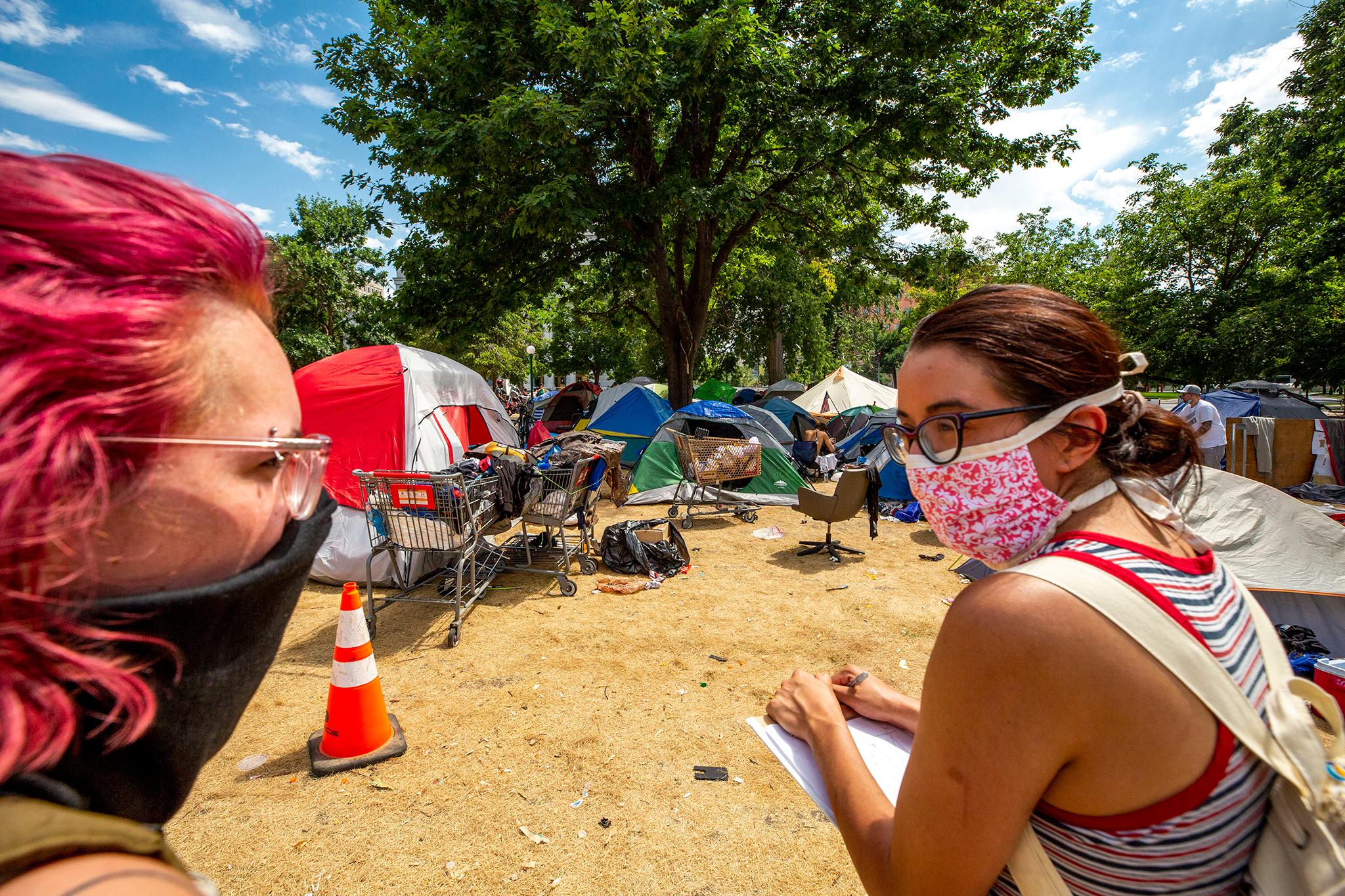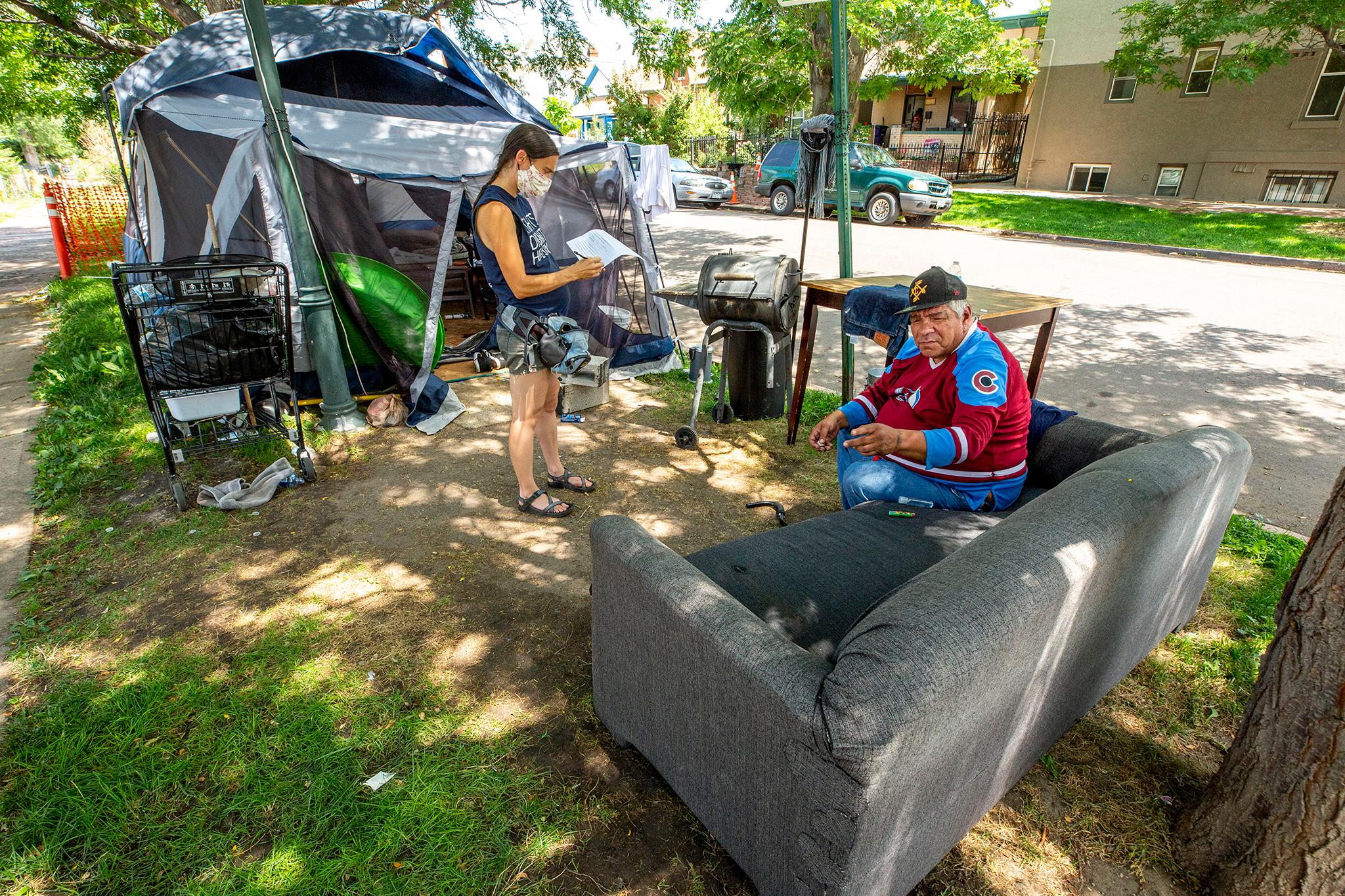Five tents, four people.
Vince Martinez counts himself among the four living on the Five Points corner where he was approached during a count of homelessness last week. In all, the advocacy organization Denver Homeless Out Loud found 664 tents and vehicles were home to an estimated 1,328 people in 30 encampments in Five Points, Capitol Hill and other parts of Denver. The count and other indicators show homelessness may be increasing amid the pandemic
"The count does not even include the large number of people who just sleep outside at night with a blanket, sleeping bags, or no cover at all," Denver Homeless Out Loud said in a statement Monday.
Terese Howard of Denver Homeless Out Loud sent volunteers to encampments. Tents were counted, and camp residents were interviewed to determine how many people lived in each tent.
Howard also did some of the counting. After speaking to her, Martinez offered another data point: three years. That's how long Martinez said he's been waiting for federal rental assistance. It's not uncommon to wait years for federal Section 8 vouchers, which are distributed by lottery to help close the gap between earnings and the cost of housing. According to the Harvard Joint Center for Housing Studies, a shortfall in federal spending leaves about three out of four households across the country who are eligible without rental assistance.
"I'm just trying to get housing and get out of this," said Martinez, who was sitting on a couch under a tree outside his tent at Glenarm Place and 29th Street.


The annual Point in Time, a national annual snapshot of homelessness overseen in the Denver region by the Metro Denver Homeless Initiative, found 996 people living outside across the city in January. According to the Metro Denver Homeless Initiative, another 3,175 people experiencing homelessness were in shelters during the 24-hour period in which the Point in Time is conducted. When the Point in Time results were released last week -- just a few days before Denver Homeless Out Loud conducted its count -- Metro Denver Homeless Initiative Executive Director Matt Meyer said the pandemic, which has slowed the economy and led to massive job losses, had likely worsened homelessness.
Jamie Rife, Metro Denver Homeless Initiative's director of communications and development, welcomed Denver Homeless Out Loud's "timely initiative."
"The economic impact (of COVID-19) is just going to continue to unfold," Rife added, noting that $600 in weekly supplemental unemployment benefits that Congress approved four months ago as part of a pandemic relief package are expiring this week.
Howard said Denver Homeless Out Loud has been getting more requests for help from people who have recently lost housing. While the survey she oversaw Friday did not include questions that would help establish a new homeless figure, residents told volunteers that most encampments had seen either an increase in residents recently or had stayed about the same.
Shelters were reaching capacity, as were hotels that the city and service providers have secured for people experiencing homelessness, said Cathy Alderman, vice president of communications and public policy for the Colorado Coalition for the Homeless. She said the Denver Homeless Out Loud figures bolstered her own sense that unsheltered homelessness was increasing.
"And we're about to hit an eviction crisis," Alderman said. A statewide moratorium on evictions that was imposed earlier during the pandemic has ended, but many people are still struggling to pay the rent.
There were good reasons to do the annual Point in Time in January, Alderman said. Among them was that cold winter weather, which usually meant more people would be in shelters where they would be easier to find and count. But she said it's useful to have current data, particularly during a pandemic.
"I'm so glad they did this," Alderman said of Denver Homeless Out Loud's count. "It makes it really hard to plan for resources if you don't have good numbers."
Samantha Batko, a researcher at the Urban Institute, said in an interview that having a current count of homelessness would help in planning how to meet needs. But she said the coronavirus made an accurate count difficult, in part because of the need to try to avoid spreading the disease. Batko noted that because of health concerns, the U.S. Census Bureau had delayed its homelessness count, originally scheduled for March, to late September.
Howard hoped her tent and camper count would inform discussions as Denver officials decide how to spend federal pandemic response aid and move toward sanctioned camping.
"We have to be real about how big our crisis is and not try to act like we can cram a thousand people into 50 spots," Howard said.

As part of efforts to address the needs of people without homes during the pandemic, Mayor Michael Hancock has said that two or three sanctioned camps would be established for the duration of the health emergency. Each camp would have 50 tents, bathroom and shower facilities and other support.
Following the arrival of the coronavirus in Denver in March, the city opened 24-hour shelters at the National Western Complex and at the Coliseum. The city and service providers have also secured hotel and motel rooms for people experiencing homelessness who are affected by the coronavirus.
The city also has earmarked $5 million in federal COVID-19 relief funds for rent, utility and mortgage assistance to try to keep people housed as an eviction moratorium ends. A portion of another $2 million in federal Housing and Urban Development COVID-19 relief funds is to be used for shelter operations and to pay security deposits and rent payments to get people who have experienced homelessness into apartments.
The Urban Institute's Batko urged policy makers to focus on quickly rehousing people who lose their homes. In a blog post on the Urban Institute's website, Batko wrote last week that investing in the strategy known as rapid re-housing, in which people are provided help finding a home, rent assistance and other support, "can prevent people experiencing unsheltered homelessness from getting sick, slow the spread of COVID-19, and reduce the number of people involved with police encampment sweeps."
Martinez has been camping at Glenarm and 29th for a month and a half, after clean-ups in recent months twice forced him to move from other Five Points corners.
The clean-ups were ordered by the health department, not by police enforcing Denver's camping ban. Police have eased up on enforcing the camping ban, which has meant people experiencing homelessness are less likely to try to keep out of sight to avoid drawing police attention.
"Never before have we been able to actually see our homelessness in the way that we are right now," Howard said. "People are visible."













